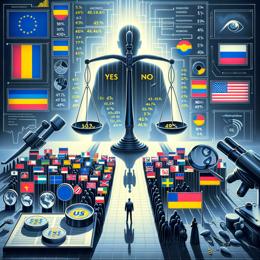Content created by AI
Netanyahu's Conditions for Middle East Peace: An Assessment of Israel's Stance
In a clear message outlined in an op-ed for The Wall Street Journal, Israeli Prime Minister Benjamin Netanyahu delineated Israel's stringent terms for regional peace as global expectations intensify for conflict resolution. Netanyahu's unwavering demands focus on three primary areas: the obliteration of Hamas, the strategic demilitarization of Gaza, and initiating a process aimed at deradicalizing Palestinian society.
These statements aren't new on the Prime Minister's agenda but are brought into the limelight as Netanyahu cements Israel's stance regarding future peace talks. Recognizing the delicacy and complexity of peacemaking in the region, the Prime Minister's article appears at a time when international pressure is peaking, seeking an urgent ceasefire and a long-term solution to the unrest.
Netanyahu's call for the destruction of Hamas is entrenched in the assertion that the militant organization, which the U.S. acknowledges as a terrorist group, has openly pledged to perpetrate violent attacks against Israel, mirroring the October 7 massacre. Netanyahu sees the eradication of Hamas not as a choice but as a necessary response to shield Israel from further bloodshed and war. To combat the network of Hamas, Netanyahu adverts to Israel’s compliance with international law, even as the nation grapples with the militant group's reported use of human shields, a tactic condemned by Netanyahu as overshadowing efforts to reduce civilian deaths.
The demilitarization of Gaza is advanced as a protective measure to ensure peace within the region. Netanyahu rejects the prospect of the Palestinian Authority overseeing Gaza and instead proposes a fortified security zone encompassing the area with a stringent inspection procedure on the Gaza-Egypt border. This, in the Israeli leader's view, is critical to preclude arms smuggling and affirms Israel's overarching security needs.
The last of Netanyahu's preconditions is perhaps the most culturally profound: a call for a societal shift in Gaza to expel extremism from its leadership and educational frameworks—a profound challenge considering the deep-seated antagonism and the longstanding narratives that permeate Palestinian society. Netanyahu references historical transformations following World War II, implying a belief in the possibility of radical change emanating from within through enlightened governance and enlightenment in classrooms.
These demands come to the fore amidst a backdrop of devastating hostilities that have seen a reported 1,200 Israeli lives taken, a wave of hostage situations, and the grievous loss of over 20,000 Palestinian lives, alongside widespread destruction in Gaza and a looming humanitarian crisis.
Prime Minister Benjamin Netanyahu's uncompromising vision conjures an image of a Middle East where regional accord might transpire post the decimation of militant structures and ideologies. Whether these rigorous prerequisites generate a pathway to lasting peace or deepen the chasm in a polarized region remains a question the international forum will grapple with, as it mediates between steadfast Israeli resolve and Palestinian quest for sovereignty.










